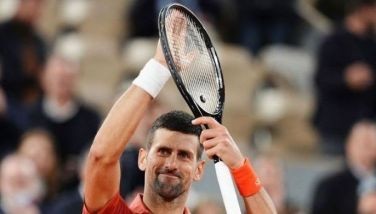Rise and fall of Indon sport
November 14, 2006 | 12:00am
JAKARTA, Indonesia — A recent issue of the Jakarta Post stated that Indonesia will be sending its smallest contingent ever in its history of participation in the Asian Games to Doha this coming December. This development seems to have been brought about by many factors, among them, a smaller pool of Asian-caliber athletes to choose from.
In talks with a number of local sports enthusiasts, the main point they bring out is that sports in Indonesia lacks the support it used to get during the time of then President Soeharto. Soeharto, who ruled Indonesia for 32 years until the late ’90s, was known to have used sports as a way of reinforcing Indonesia’s credibility in the international community through its domination of Southeast Asian sports and its satisfactory performance in the bigger and more competitive Asian Games.
There was a time, up to 2001, that Indonesia, would win the overall championship of the Southeast Asian Games (SEA Games) with boring and predictable regularity. In 2003 and 2005, the host countries of Vietnam and the Philippines, respectively, won the overall championship of the SEA Games. Prior to these years, Indonesia managed to be at the top of the heap except for a number of occasions when Malaysia and Thailand hosted the SEA Games and managed to pull one over the Indons. Otherwise, Indonesia was the sports power.
The Asian financial crisis in 1997 changed all that. 1997 was the last year Indonesia hosted the SEA Games and was also one of the last years for it to display its regional athletic might. Political and racial upheavals leading to the ouster of Soeharto triggered vast changes that included sports development being momentarily sidelined.
The almost total lack of a vibrant sports development is obvious in many ways, according to some sports observers. For example, they point out one ironic thing: Indonesia is supposed to be one of badminton powers of the world and yet it is very difficult to find a public badminton court in Jakarta.
Soccer fields and tennis courts are aplenty but badminton lovers will be hard put to play their sport in this capital city. In contrast, badminton courts in Metro Manila have sprouted all over the place with idle warehouses being converted into badminton havens. It is no surprise therefore that Indonesian badminton players are now training in Manila courts.
If Indonesian badminton athletes are finding the future bleak in Indonesia, such is not true in the United States. A number of top-ranked Indonesian shuttlecock artists have found their way to America where there is an attempt to popularize the sport. The Americans are trying to catch up with Europe where badminton has become a gender- and age- friendly sport. And the main impetus for this surging popularity is the Indonesian badminton player who has chosen to go abroad in search of greener pastures by transferring technology to the developed countries.
Although Indonesia still ranks as one of the world’s badminton powers, soccer is still the sport for the majority of Indonesia’s 220 million people. During the 2006 FIFA World Cup held in Germany in June and July this year, office schedules were altered to accommodate employees who watched the matches live during the wee hours of the morning.
Soccer matches are shown on free television in Indonesia to allow as many people as possible to see the games. To air the matches on cable TV or on pay-per-view is to invite trouble and widespread indignation. So, unlike the Philippines where the most of the World Cup matches were shown live on cable, Indonesians enjoyed watching soccer’s best on free television.
The same goes for boxing. Manny Pacquiao’s fights are shown on free TV in Indonesia. Filipino expats therefore point out that Pacquiao is also a revered name in Indonesia. And so with Efren "Bata" Reyes, simply because billiards is also very popular among Indonesians. It is no surprise therefore that local billiards enthusiasts marvel at the Philippines’ Ronato Alcano’s triumph in the world pool championship.
Speaking of Pacquiao, I had a phone conversation with top sports nutritionist Sanirose Orbeta on my way to Jakarta from Bandung Saturday afternoon and Orbeta has declined to grant interviews with Philippine media with respect to the weight reduction regimen of Erik Morales and Pacquiao. Orbeta said that she had to refuse the invitation of one TV station in the Philippines to comment on both protagonists’ regimens "as a matter of professional ethics." Orbeta added that it would not look good for her to publicly say something about what the Morales and Pacquiao camps are doing "simply because I do not want to cast doubt on what they’re doing."
The Indonesians look forward to the Grand Finale and look at Pacquiao as a model for how their own boxers can make it to big time boxing. They are aware that pro boxing, which started relatively late in Indonesia, will grow by the proverbial leaps and bounds if their local pugilists make it to the US and are also featured on prime time TV. Because there is a proliferation of TV stations in Indonesia, TV viewing is the number one past time in the country.
It is to be noted that Indonesia is probably the only market driven economy where commercial spots on TV are cheaper than print advertisements.
We’re on our way home via Singapore after visiting the Maranatha Christian University (MCU) in Bandung, capital of West Java. The sprawling MCU campus is the home of the De La Salle Professional Schools Graduate School of Business International Master of Business Administration (MBA) Program in this part of Indonesia.
Bandung, which is a shopper’s paradise, is a booming city that is learning to cope with big city problems like garbage and traffic. Thousands of local and overseas tourists visit Bandung thus challenging the city’s ability to cope with the daily influx.
The Jakarta Post states that the number of private vehicles, including motorcycles in 2000 in Bandung was around 457,000. This increases by about 20 percent each year thus making it difficult to prevent traffic jams along Bandung’s 1,169 kilometers of roads.
In talks with a number of local sports enthusiasts, the main point they bring out is that sports in Indonesia lacks the support it used to get during the time of then President Soeharto. Soeharto, who ruled Indonesia for 32 years until the late ’90s, was known to have used sports as a way of reinforcing Indonesia’s credibility in the international community through its domination of Southeast Asian sports and its satisfactory performance in the bigger and more competitive Asian Games.
There was a time, up to 2001, that Indonesia, would win the overall championship of the Southeast Asian Games (SEA Games) with boring and predictable regularity. In 2003 and 2005, the host countries of Vietnam and the Philippines, respectively, won the overall championship of the SEA Games. Prior to these years, Indonesia managed to be at the top of the heap except for a number of occasions when Malaysia and Thailand hosted the SEA Games and managed to pull one over the Indons. Otherwise, Indonesia was the sports power.
The Asian financial crisis in 1997 changed all that. 1997 was the last year Indonesia hosted the SEA Games and was also one of the last years for it to display its regional athletic might. Political and racial upheavals leading to the ouster of Soeharto triggered vast changes that included sports development being momentarily sidelined.
The almost total lack of a vibrant sports development is obvious in many ways, according to some sports observers. For example, they point out one ironic thing: Indonesia is supposed to be one of badminton powers of the world and yet it is very difficult to find a public badminton court in Jakarta.
Soccer fields and tennis courts are aplenty but badminton lovers will be hard put to play their sport in this capital city. In contrast, badminton courts in Metro Manila have sprouted all over the place with idle warehouses being converted into badminton havens. It is no surprise therefore that Indonesian badminton players are now training in Manila courts.
If Indonesian badminton athletes are finding the future bleak in Indonesia, such is not true in the United States. A number of top-ranked Indonesian shuttlecock artists have found their way to America where there is an attempt to popularize the sport. The Americans are trying to catch up with Europe where badminton has become a gender- and age- friendly sport. And the main impetus for this surging popularity is the Indonesian badminton player who has chosen to go abroad in search of greener pastures by transferring technology to the developed countries.
Although Indonesia still ranks as one of the world’s badminton powers, soccer is still the sport for the majority of Indonesia’s 220 million people. During the 2006 FIFA World Cup held in Germany in June and July this year, office schedules were altered to accommodate employees who watched the matches live during the wee hours of the morning.
Soccer matches are shown on free television in Indonesia to allow as many people as possible to see the games. To air the matches on cable TV or on pay-per-view is to invite trouble and widespread indignation. So, unlike the Philippines where the most of the World Cup matches were shown live on cable, Indonesians enjoyed watching soccer’s best on free television.
The same goes for boxing. Manny Pacquiao’s fights are shown on free TV in Indonesia. Filipino expats therefore point out that Pacquiao is also a revered name in Indonesia. And so with Efren "Bata" Reyes, simply because billiards is also very popular among Indonesians. It is no surprise therefore that local billiards enthusiasts marvel at the Philippines’ Ronato Alcano’s triumph in the world pool championship.
Speaking of Pacquiao, I had a phone conversation with top sports nutritionist Sanirose Orbeta on my way to Jakarta from Bandung Saturday afternoon and Orbeta has declined to grant interviews with Philippine media with respect to the weight reduction regimen of Erik Morales and Pacquiao. Orbeta said that she had to refuse the invitation of one TV station in the Philippines to comment on both protagonists’ regimens "as a matter of professional ethics." Orbeta added that it would not look good for her to publicly say something about what the Morales and Pacquiao camps are doing "simply because I do not want to cast doubt on what they’re doing."
The Indonesians look forward to the Grand Finale and look at Pacquiao as a model for how their own boxers can make it to big time boxing. They are aware that pro boxing, which started relatively late in Indonesia, will grow by the proverbial leaps and bounds if their local pugilists make it to the US and are also featured on prime time TV. Because there is a proliferation of TV stations in Indonesia, TV viewing is the number one past time in the country.
It is to be noted that Indonesia is probably the only market driven economy where commercial spots on TV are cheaper than print advertisements.
We’re on our way home via Singapore after visiting the Maranatha Christian University (MCU) in Bandung, capital of West Java. The sprawling MCU campus is the home of the De La Salle Professional Schools Graduate School of Business International Master of Business Administration (MBA) Program in this part of Indonesia.
Bandung, which is a shopper’s paradise, is a booming city that is learning to cope with big city problems like garbage and traffic. Thousands of local and overseas tourists visit Bandung thus challenging the city’s ability to cope with the daily influx.
The Jakarta Post states that the number of private vehicles, including motorcycles in 2000 in Bandung was around 457,000. This increases by about 20 percent each year thus making it difficult to prevent traffic jams along Bandung’s 1,169 kilometers of roads.
BrandSpace Articles
<
>
- Latest
- Trending
Trending
Latest
Trending
Latest
Recommended
































